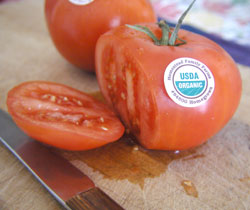
"Organic" is a term that sounds like something a treehugger should like, but I never really knew specifically why I'd be expected to. I'd heard that some of the so-called benefits aren't really all that significant. So like many issues related to being environmentally-conscious, I was unsure as to whether it was something I should investigate and pursue more, or whether I was spending more time and coin for very little upside. The article below helps answer the question somewhat:
The Good and Bad about OrganicsListening to: Bellyaching about the Canadian hockey team.
February 22, 2006 — By Lisa Roberts, Orlando Sentinel A Consumer Reports survey recently found that organic produce can cost as much as double the price of traditionally grown products. Is it worth the extra money to keep clear of pesticides? Not always, the magazine concludes, pointing to an analysis of USDA data by the Environmental Working Group of Washington, D.C.
Based on thousands of samples, the nonprofit research group came up with the "dirty dozen" -- vegetables and fruits that have high pesticide residuals, even after washing. They are apples, bell peppers, celery, cherries, imported grapes, nectarines, peaches, pears, potatoes, red raspberries, spinach and strawberries. Lowest in residual pesticides are asparagus, avocados, bananas, broccoli, cauliflower, sweet corn, kiwi, mangos, onions, papaya, pineapples and sweet peas.
Although proponents say organics are tastier, safer and more nutritious, "no clear scientific evidence [of that] exists," says Tejal Parekh, a registered dietitian at M.D. Anderson Cancer Center in Orlando. Organics might have no pesticide residue, but studies have yet to show that ingesting such residue causes health problems. However, there is little argument that organic farming, which shuns pesticides and synthetic fertilizers, does less harm to the environment than conventional methods.
If you can afford to buy organics in place of the dirty dozen, "certainly it would be beneficial to you," Parekh says. Other organic produce, though, might not justify its higher price. If you find the price too steep, there's no reason to cut down on fruits and vegetables. Just give everything a good scrubbing before preparing it.
However, "if you are eating a lot of meat, poultry and dairy foods, then you might want to make some of those foods organic, too, especially if you have children," Parekh says. "You won't get all the antibiotics and hormones given to those animals."
On its Web site, the Organic Trade Association (ota.com) says organic products cost more because the industry must meet stricter regulations in the growing, harvesting, transporting and storing of the products. That makes the process more labor- and management-intensive. Also, farming tends to be on a smaller scale.

No comments:
Post a Comment